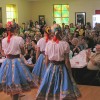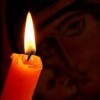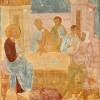What is sanctity?
Sanctity is holiness. In many languages, the word “saint” and “holy” are the same word, and so is the word for sanctity and holiness. A saint is a holy person. What, then, is holiness?
In the Bible, things, places or people are called “holy” when they are seen as godly, or befitting to God. Of course, all things were created holy by the Holy One, but as we have fallen away from that goodness, the word “holy” comes to mean something or someone set apart from that fallenness, dedicated to God in restored goodness. In the Old Testament, to be set apart for God could have a ritual sense, as where a person, place or thing was set apart for a certain role in a liturgical rite. But being set apart for God also means dedicating one’s life to the service of God. The other characteristics that are frequently associated with holiness throughout the Church’s tradition – purity, righteousness, humility, self-restraint, sincerity, and faith – ultimately boil down to that one thing: dedicating one’s life to God.
The saints are the members of the Church
We are accustomed to thinking of the saints as the great exceptions of humanity, the ones set apart from the rest of us by their holiness. And in an important sense this is true. Yet why is it that St. Paul frequently refers to all of the Christians of a particular city as “the saints” of that place? I seems that, to the Apostle, all members of the Church were saints.
In St. Paul’s logic, to be in the Church is to be “set apart” from the world, in the sense that the Church itself is both in the world and “called out” of the world. That means that as baptized members of the Church, we are saints. But, before we start commissioning icons of ourselves, we should remember that our baptism, and the holiness (sainthood) that it bears, is both a gift and a calling. Baptism makes us members of the Church, and thus “saints.” And yet we must constantly be striving to attain to that calling, truly to be persons “of the Church” and therefore truly saints.
To be a member of the Church is in fact a higher calling than we might often think. When we pray, “Let us commend ourselves and each other, and our whole life unto Christ our God,” we mean it. We are praying that individually (“ourselves”) and corporately (“and each other”) we have the intention to be saints, commending our life unto God. That is what it means truly to be in the Church. It takes more than a baptismal certificate and a “Member In Good Standing” card.
Being saints today
In one sense, sanctity is a quality that is changeless from era to era. To be holy is in many respects the same basic thing no matter when we live. Purity is purity, righteousness is righteousness. And yet we also need to reflect on the changing circumstances in which that purity, that righteousness is to be fulfilled.
The desert fathers of the fifth and sixth century, recognizing that the context of sanctity is evolving, often wrote about how much stricter their predecessors were. They seem to be saying, as parents have from time immemorial, “…In those days it was different, not like today, when kids have it so easy!” Some even recognized that this evolution would continue, speaking of a time to come when the one who has faith will be considered insane, a time when the one who manages simply to retain his faith will be greater than the miracle-workers of old.
From what I’ve said so far, it would seem that sanctity is on the one hand something that sets some people apart from others, and on the other hand something that unites everyone in the Church. And furthermore, sanctity has both a changeless quality, and it is also something that will take different forms in different contexts.
As to the first of these apparent dichotomies, we do well to maintain a great esteem for the saints – which would include a devotion to them, prayer to and with them, and a prayerful reading of their written lives. But we must avoid separating the saints from ourselves to the point where sanctity becomes an utterly unattainable ideal. Sanctity is God’s will for everyone, and it is our clear and definite vocation as faithful members of the Church. Sanctity is also not a simple “yes or no” proposition. Done right, the very pursuit of sanctity is sanctity. It is a journey without arrival, and our failures on the way must not be cause for despair, but for change and renewal.
As to the second, we ought to focus on the unchanging characteristics of sanctity. This means living the life of the Church, partaking meaningfully of its sacramental and liturgical life, attending to our prayer life, fasting, pursuing the true theology. It also means applying all of these disciplines in the way in which we treat our neighbor and society as a whole – pursuing justice, righteousness, charity and care for the sick and poor. These are the constants of sanctity.
What of sanctity in today’s society? The modern/postmodern world puts so much stimulus and information before us – the good mixed in with the bad – with little or no orientation. This waterfall of data is probably the main characteristic which distinguishes ours from the context of the ancients. Within this huge span of information and choices we must consider the nature of the internet, the nature of the entertainment business, but also the smorgasbord of faiths and world-views, not to mention the challenges and possibilities of the modern ecumenical situation.
How each Christian finds his or her way to sanctity within this hall of mirrors will have some common points with the holiness we know from the past. But it may well be that we have arrived at the age foretold by the desert fathers, where there will be no miracles, but just to stay sane and faithful will be the greatest wonderworking of all. Furthermore, we ought to expect a great diversity of manifestations of sanctity. If sanctity is truly the devotion to God’s will, the fulfilling of God’s will for each of us in our own circumstances then this is surely so. Over the ages there has been a great variety of forms of sanctity, as seen in the martyrs, confessors, apostles, preachers, ascetics, missionaries, healers, and fools for Christ. All of these categories certainly live on today. But can there not be other varieties of sanctity, other subdivisions?
The Church has left us with a wealth of materials which outline the way of the ascetic. Surely these materials, in some of their aspects, pertain not only to the enclosed monastic but also, by extension, to the rest of us. But we do not have much in the way of explicit instruction on how to use the things of the modern world for the glory of God. In fact, we have very little instruction from the fathers on something so basic to most of us as being married and having children.
Similarly, the written lives of the saints are a gift to the Church for our instruction, edification and example. Yet, owing to the context in which they were written, and their intended function, they often leave unaddressed the wrestlings of the saints with the ambiguities of society, with their own failings, and with contemporary thought. There are exceptions, of course, but classical hagiography, by its very nature, paints with very broad strokes.
This situation leaves us to ponder the nature of sanctity today. As we wrestle with the apparent dichotomy of being “not of this world” and yet “in the world,” as we ponder how far to “incarnate” holiness into our context of the modern West, we must imagine that there will be saints all along the spectrum. Some will continue to disassociate themselves with all the distractions and technological temptations of this world. Some will engage more fully with such things, striving with great efforts to use them to the glory of God. Either of these paths, and all the permutations between them, can be a way of sanctity or perdition.
Can we imagine a webmaster saint? Could there be, among today’s novelists, among the film directors, among the writers of The Simpsons, people who are pursuing sanctity? Geneticists, corporate lawyers, rap singers… It is our task as residents of the world today to ponder the entire range of ways in which we might fulfill our God-given vocation to be saints. The way forward is both charted and uncharted.
















